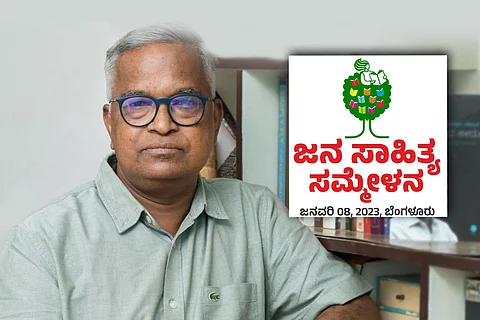

The 86th Kannada Sahitya Sammelana, a literary event set to take place in Karnataka’s Haveri on January 6 and 8, has faced criticism for its lack of representation of Muslim writers. Despite there being a significant number of Muslim writers and scholars in Karnataka, reportedly, not many Muslim names have been included on any of the panels at the upcoming festival. In response, a group of scholars are now organising an alternate literary festival in Bengaluru on Sunday, January 8, as a protest.
The alternative literary festival, known as the Jana Sahitya Sammelana, is organised by writers and intellectuals who are unhappy with how the Kannada Sahitya Sammelana is being planned. The Jana Sahitya Sammelana will be held on January 8 at the Alumni Hall in Bengaluru’s KR Circle and is expected to be attended by a number of notable writers, poets, and intellectuals. Topics such as attacks on minorities and the role of the literary world, the contribution of Christian missionaries to the Kannada language, Kannadigas and harmony, as well as politics and the abuse of food, will be discussed by eminent writers and scholars such as Professor S Jafar, Janagere Venkataramaiah, Rajendra Chenni, Munner Katipalla, Chand Pasha, Teena Shashank, and Kumaraswamy Bejjihalli, among others. According to The Hindu, the Jana Sahitya Sammelana is not intended to be a replacement for the Kannada Sahitya Sammelana, but rather, a way to register protest against the exclusion of certain writers from the later event.
The controversy surrounding the lack of representation at the Kannada Sahitya Sammelana has sparked a larger conversation about the role of literary festivals in promoting inclusivity and diversity. Many have called for a more equitable distribution of platforms and opportunities for writers from all backgrounds to have their voices heard. The Kannada Sahitya Parishat, which organises the Kannada Sahitya Sammelana, is an independent non-profit that is often seen as a representative of the Kannada language. It is funded by the Karnataka government and its activities, including the literary meet, are supported with taxpayer money. As a result, the exclusion of Muslim writers has been met with outrage.
Eminent Kannada Scholar and Professor Purushottama Bilimale took to Facebook and said that the exclusion of Muslim writers from the event is not an accident, but rather a reflection of the way in which certain writers have historically been excluded from literary conferences in the region. He also published a list of notable Muslim writers in Kannada literature and called for their inclusion at the event.